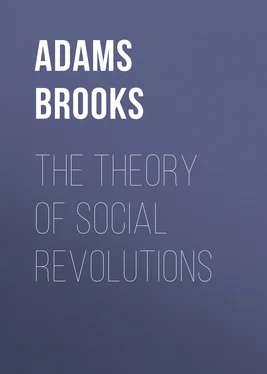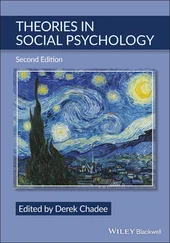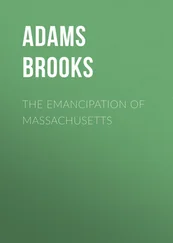Brooks Adams - The Theory of Social Revolutions
Здесь есть возможность читать онлайн «Brooks Adams - The Theory of Social Revolutions» — ознакомительный отрывок электронной книги совершенно бесплатно, а после прочтения отрывка купить полную версию. В некоторых случаях можно слушать аудио, скачать через торрент в формате fb2 и присутствует краткое содержание. Жанр: foreign_edu, Юриспруденция, Политика, на английском языке. Описание произведения, (предисловие) а так же отзывы посетителей доступны на портале библиотеки ЛибКат.
- Название:The Theory of Social Revolutions
- Автор:
- Жанр:
- Год:неизвестен
- ISBN:нет данных
- Рейтинг книги:4 / 5. Голосов: 1
-
Избранное:Добавить в избранное
- Отзывы:
-
Ваша оценка:
- 80
- 1
- 2
- 3
- 4
- 5
The Theory of Social Revolutions: краткое содержание, описание и аннотация
Предлагаем к чтению аннотацию, описание, краткое содержание или предисловие (зависит от того, что написал сам автор книги «The Theory of Social Revolutions»). Если вы не нашли необходимую информацию о книге — напишите в комментариях, мы постараемся отыскать её.
The Theory of Social Revolutions — читать онлайн ознакомительный отрывок
Ниже представлен текст книги, разбитый по страницам. Система сохранения места последней прочитанной страницы, позволяет с удобством читать онлайн бесплатно книгу «The Theory of Social Revolutions», без необходимости каждый раз заново искать на чём Вы остановились. Поставьте закладку, и сможете в любой момент перейти на страницу, на которой закончили чтение.
Интервал:
Закладка:
That some of the more sagacious of the capitalistic class have preserved that instinct of self-preservation which was so conspicuous among men of the type of Washington, is apparent from the position taken by the management of the United States Steel Company, and by the Republican minority of the Congressional Committee which recently investigated the Steel Company; but whether such men very strongly influence the genus to which they belong is not clear. If they do not, much improvement in existing conditions can hardly be anticipated.
If capital insists upon continuing to exercise sovereign powers, without accepting responsibility as for a trust, the revolt against the existing order must probably continue, and that revolt can only be dealt with, as all servile revolts must be dealt with, by physical force. I doubt, however, if even the most ardent and optimistic of capitalists would care to speculate deeply upon the stability of any government capital might organize, which rested on the fundamental principle that the American people must be ruled by an army. On the other hand any government to be effective must be strong. It is futile to talk of keeping peace in labor disputes by compulsory arbitration, if the government has not the power to command obedience to its arbitrators' decree; but a government able to constrain a couple of hundred thousand discontented railway employees to work against their will, must differ considerably from the one we have. Nor is it possible to imagine that labor will ever yield peaceful obedience to such constraint, unless capital makes equivalent concessions,–unless, perhaps, among other things, capital consents to erect tribunals which shall offer relief to any citizen who can show himself to be oppressed by the monopolistic price. In fine, a government, to promise stability in the future, must apparently be so much more powerful than any private interest, that all men will stand equally before its tribunals; and these tribunals must be flexible enough to reach those categories of activity which now lie beyond legal jurisdiction. If it be objected that the American people are incapable of an effort so prodigious, I readily admit that this may be true, but I also contend that the objection is beside the issue. What the American people can or cannot do is a matter of opinion, but that social changes are imminent appears to be almost certain. Though these changes cannot be prevented, possibly they may, to a degree, be guided, as Washington guided the changes of 1789. To resist them perversely, as they were resisted at the Chicago Convention of 1912, can only make the catastrophe, when it comes, as overwhelming as was the consequent defeat of the Republican party.
Approached thus, that Convention of 1912 has more than a passing importance, since it would seem to indicate the ordinary phenomenon, that a declining favored class is incapable of appreciating an approaching change of environment which must alter its social status. I began with the proposition that, in any society which we now understand, civilization is equivalent to order, and the evidence of the truth of the proposition is, that amidst disorder, capital and credit, which constitute the pith of our civilization, perish first. For more than a century past, capital and credit have been absolute, or nearly so; accordingly it has not been the martial type which has enjoyed sovereignty, but the capitalistic. The warrior has been the capitalists' servant. But now, if it be true that money, in certain crucial directions, is losing its purchasing power, it is evident that capitalists must accept a position of equality before the law under the domination of a type of man who can enforce obedience; their own obedience, as well as the obedience of others. Indeed, it might occur, even to some optimists, that capitalists would be fortunate if they could certainly obtain protection for another fifty years on terms as favorable as these. But at Chicago, capitalists declined even to consider receding to a secondary position. Rather than permit the advent of a power beyond their immediate control, they preferred to shatter the instrument by which they sustained their ascendancy. For it is clear that Roosevelt's offence in the eyes of the capitalistic class was not what he had actually done, for he had done nothing seriously to injure them. The crime they resented was the assertion of the principle of equality before the law, for equality before the law signified the end of privilege to operate beyond the range of law. If this principle which Roosevelt, in theory at least, certainly embodied, came to be rigorously enforced, capitalists perceived that private persons would be precluded from using the functions of sovereignty to enrich themselves. There lay the parting of the ways. Sooner or later almost every successive ruling class has had this dilemma in one of its innumerable forms presented to them, and few have had the genius to compromise while compromise was possible. Only a generation ago the aristocracy of the South deliberately chose a civil war rather than admit the principle that at some future day they might have to accept compensation for their slaves.
A thousand other instances of similar incapacity might be adduced, but I will content myself with this alone.
Briefly the precedents induce the inference that privileged classes seldom have the intelligence to protect themselves by adaptation when nature turns against them, and, up to the present moment, the old privileged class in the United States has shown little promise of being an exception to the rule.
Be this, however, as it may, and even assuming that the great industrial and capitalistic interests would be prepared to assist a movement toward consolidation, as their ancestors assisted Washington, I deem it far from probable that they could succeed with the large American middle class, which naturally should aid, opposed, as it seems now to be, to such a movement. Partially, doubtless, this opposition is born of fear, since the lesser folk have learned by bitter experience that the powerful have yielded to nothing save force, and therefore that their only hope is to crush those who oppress them. Doubtless, also, there is the inertia incident to long tradition, but I suspect that the resistance is rather due to a subtle and, as yet, nearly unconscious instinct, which teaches the numerical majority, who are inimical to capital, that the shortest and easiest way for them to acquire autocratic authority is to obtain an absolute mastery over those political tribunals which we call courts. Also that mastery is being by them rapidly acquired. So long as our courts retain their present functions no comprehensive administrative reform is possible, whence I conclude that the relation which our courts shall hold to politics is now the fundamental problem which the American people must solve, before any stable social equilibrium can be attained.
Theodore Roosevelt's enemies have been many and bitter. They have attacked his honesty, his sobriety, his intelligence, and his judgment, but very few of them have hitherto denied that he has a keen instinct for political strife. Only of late has this gift been doubted, but now eminent politicians question whether he did not make a capital mistake when he presented the reform of our courts of law, as expounders of the Constitution, as one of his two chief issues, in his canvass for a nomination for a third presidential term.
After many years of study of, and reflection upon, this intricate subject I have reached the conviction that, though Mr. Roosevelt may have erred in the remedy which he has suggested, he is right in the principle which he has advanced, and in my next chapter I propose to give the evidence and explain the reasons which constrain me to believe that American society must continue to degenerate until confusion supervenes, if our courts shall remain semi-political chambers.
Читать дальшеИнтервал:
Закладка:
Похожие книги на «The Theory of Social Revolutions»
Представляем Вашему вниманию похожие книги на «The Theory of Social Revolutions» списком для выбора. Мы отобрали схожую по названию и смыслу литературу в надежде предоставить читателям больше вариантов отыскать новые, интересные, ещё непрочитанные произведения.
Обсуждение, отзывы о книге «The Theory of Social Revolutions» и просто собственные мнения читателей. Оставьте ваши комментарии, напишите, что Вы думаете о произведении, его смысле или главных героях. Укажите что конкретно понравилось, а что нет, и почему Вы так считаете.












